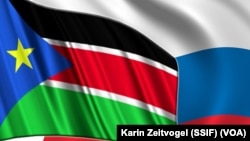JUBA —
A South Sudan delegation led by Foreign Affairs Minister Barnaba Marial Benjamin has received assurances during a visit to Moscow that Russia will use its veto in the Security Council to block United Nations sanctions on South Sudan.
Foreign Ministry spokesman Mawien Makol Arik said Marial has used the visit to Russia to explain that imposing new sanctions on South Sudan "will not help the efforts of peace."
"We need to be given time. We need to be supported morally, financially, materially,
so that we can be able to first bring peace to the people and, most importantly, to alleviate the suffering that our people are in," Arik said.
But, Arik added, reaching out to Russia should not hurt relations with other countries that support sanctions, including the United States, which earlier this month imposed targeted sanctions against two military leaders from South Sudan, one from either side of the conflict.
U.S. Ambassador to South Sudan Susan Page has warned more sanctions could be levied by the United States against anyone who commits human rights abuses or stands in the way of peace in South Sudan.
The United States also imposed targeted sanctions on nearly 100 Russian individuals and some 20 companies after Russia annexed Crimea in March.
Arik said South Sudan is not turning away from the United States, but simply reaching out to other friends.
"It is not a shift. We are still working with the western world. We are still having our relations with the United States, but we are inviting other countries to come on our help, to be able to be supportive to us and respond to our needs," he said.
Arik said South Sudan is looking for all forms of support, not just monetary.
"Support cannot only be material support or money. It can also be moral support," he said.
"Russians have been supporting in trying good things for us, helping us, even praying for us," Arik said.
According to Arik, Marial invited Russian President Vladimir Putin to visit South Sudan, but he was unable to say if Putin has accepted the invitation.
Foreign Ministry spokesman Mawien Makol Arik said Marial has used the visit to Russia to explain that imposing new sanctions on South Sudan "will not help the efforts of peace."
"We need to be given time. We need to be supported morally, financially, materially,
so that we can be able to first bring peace to the people and, most importantly, to alleviate the suffering that our people are in," Arik said.
But, Arik added, reaching out to Russia should not hurt relations with other countries that support sanctions, including the United States, which earlier this month imposed targeted sanctions against two military leaders from South Sudan, one from either side of the conflict.
U.S. Ambassador to South Sudan Susan Page has warned more sanctions could be levied by the United States against anyone who commits human rights abuses or stands in the way of peace in South Sudan.
The United States also imposed targeted sanctions on nearly 100 Russian individuals and some 20 companies after Russia annexed Crimea in March.
South Sudan 'reaching out to other friends'
Arik said South Sudan is not turning away from the United States, but simply reaching out to other friends.
"It is not a shift. We are still working with the western world. We are still having our relations with the United States, but we are inviting other countries to come on our help, to be able to be supportive to us and respond to our needs," he said.
Arik said South Sudan is looking for all forms of support, not just monetary.
"Support cannot only be material support or money. It can also be moral support," he said.
"Russians have been supporting in trying good things for us, helping us, even praying for us," Arik said.
According to Arik, Marial invited Russian President Vladimir Putin to visit South Sudan, but he was unable to say if Putin has accepted the invitation.




